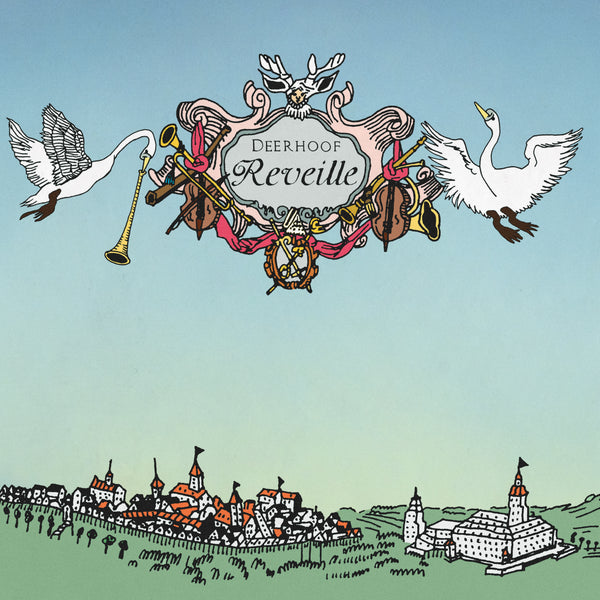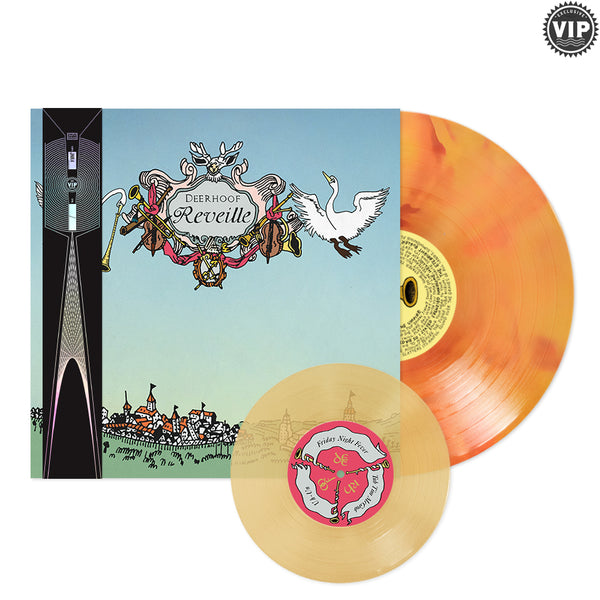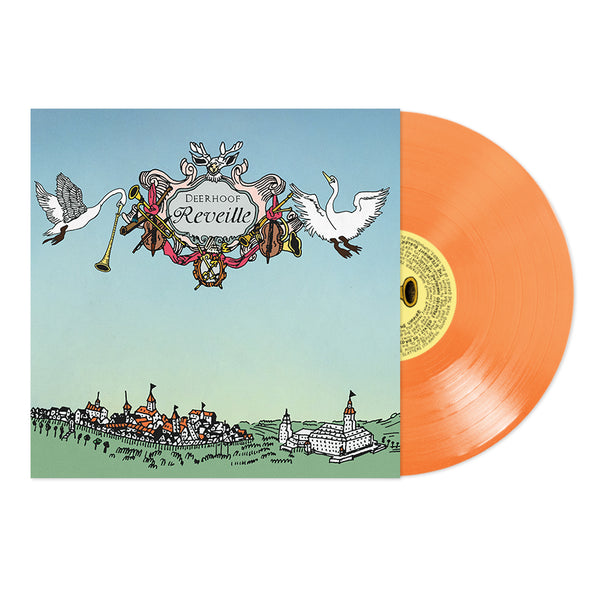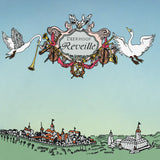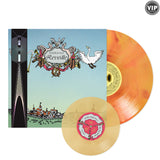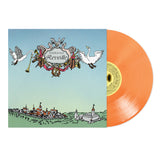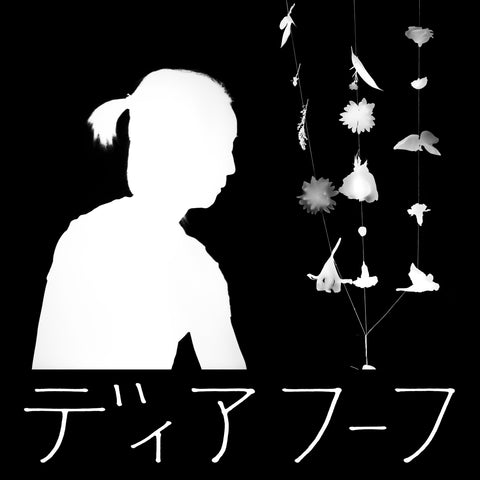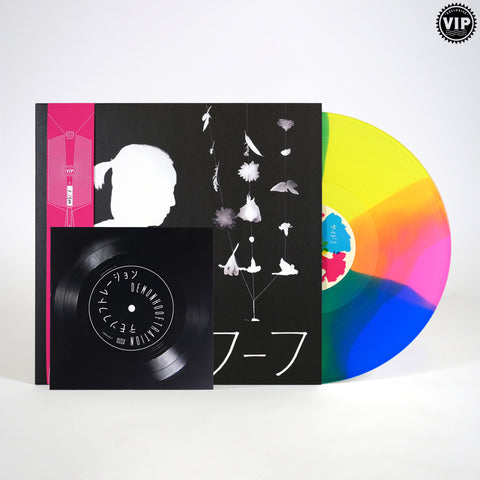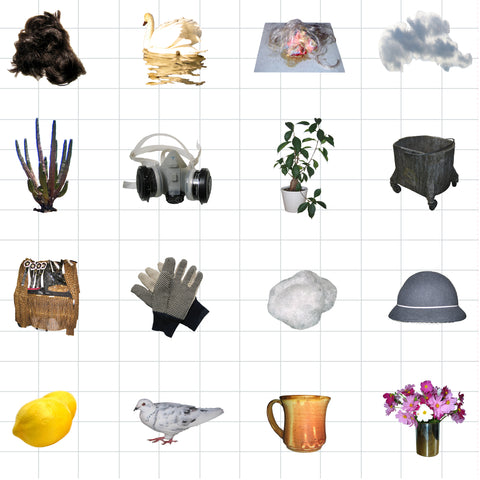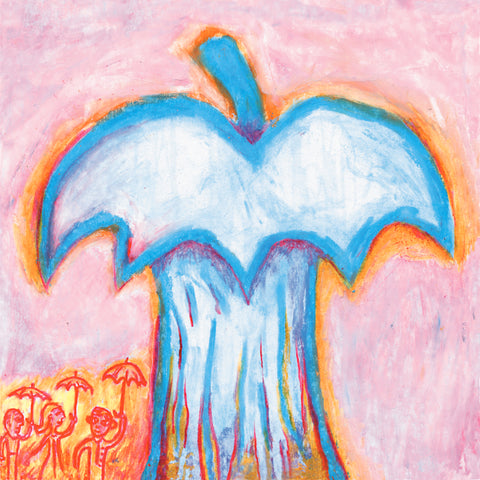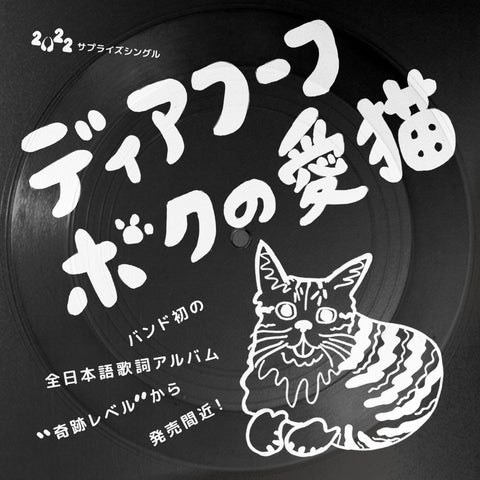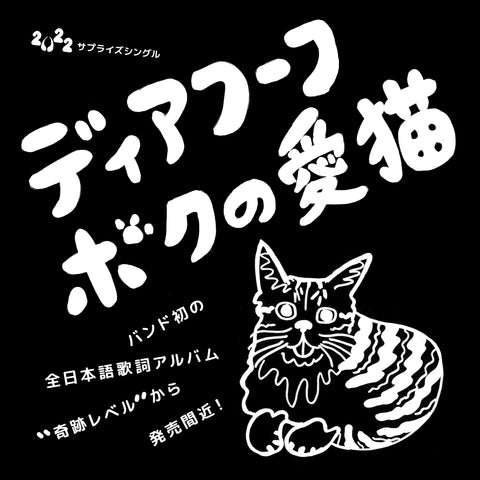$ 30.00 USD
SOLD OUT
- Sound the Alarm
- This Magnificent Bird Will Rise
- The Eyebright Bugler
- Punch Buggy Valves
- No One Fed Me So I Stayed
- Frenzied Handsome, Hello!
- Days & Nights in the Forest
- Top Tim Rubies
- Hark the Umpire
- Our Angel's Ululu
- The Last Trumpeter Swan
- Tuning a Stray
- Holy Night Fever
- All Rise
- Cooper
- Hallelujah Chorus
BONUS 7"
1. Friday Night Fever
2. Tub Tim McGrob
3. Uh-Un
4. Almuatin
Back in print on vinyl! Deerhoof debuts their new guitarist John Dieterich and achieves widespread critical acclaim for the first time. 2002’s Reveille is a defiant expression of artistic rebirth, spilling over with madcap exuberance, apocalyptic imagery, newfound technical confidence belying their no-budget DIY recording methods, and jarring stylistic about-faces in which no two songs sound alike. The contrast of Satomi’s ever-catchy, ever-charming melodiousness with John and Greg’s noisy, cinematic bombast still has the power to thrill and tickle and upset, more than 20 years after its initial release.
Includes reimagined cover art with the faint morning glow the band had always envisioned, pressed on clear sun-colored vinyl. Complete lyrics included for the first time, written by Satomi on the center labels.
This record was our resurrection from oblivion. We didn’t realize it at the time of course. We were only making it for giggles. In 1999 Satomi and I thought we were surely finished as a band. Our founder and guitarist Rob Fisk had quit. I went back to school in defeat. It’s incredible to me that Satomi and I then asked the first guitar player I met at school to join and that man turned out to be John Dieterich. He’d just moved to Oakland and didn’t mind playing for the 20 people we always played to at the Stork Club.
Over two years we recorded and rejected endless songs, casting around randomly in all different styles that we never played when Rob was in the band. Things started making sense when we hit on Judgement Day as our central image. But instead of a Western god allowing capitalist Christians like George Bush through the gates, a Deergod damned them in favor of populating heaven with animals. It was very Rob Fisk. Deerhoof charged back to life.
And Reveille turned into an actual new dawn for us. It was well received and we started touring more and now we still are doing so and it’s fun.
---Greg Saunier, 2024Deerhoof has never had a single “breakout” album. For Deerhoof fans, everyone’s favorite album seems to be whichever one they first heard. For me, Reveille is that album. I remember first hearing it when I was about 19 years old. At first, my brain couldn’t make sense of it… How could music like this be created? What approach to songwriting or playing would possibly produce songs that sounded like this? The fluttering chaotic drums. The time signatures yo-yoing up and down a sliding scale, according to some hidden logic—or perhaps by virtue of a devotion to the void underlying all such logic. Satomi’s vocals, perfectly juxtaposing the crunching feedback-laden guitars and explosively complex percussion. I had never heard anything that sounded so savage and cute at once. So chaotic and yet so precise. Persistently playful…yet *aggressively* playful. A cartoonish but authentic other world seemed to lie just beyond this sonic fringe or hem of the mystery.
In my mind, both order and accident seemed equally impossible as explanations for the sounds that I was hearing. Could it be that they had no idea what they were doing? But elements of an intelligent design also seemed clearly and unmistakably present. What kind of method or psychic bag-of-tricks during band practice or recording would generate the living, shapeshifting quality of this sound spread out over the length of this album? With absolute bewilderment, I had to come to grips with the fact that I had no idea.
The urban legend that I heard about how the album was crafted evoked an image of the group’s cultic adherence to a stringent DIY extremism as a major element of what sets them apart in their sound. As it was related to me (based on the account of a friend, who’d read about it in Tape Op or somewhere): not only had the album been self-recorded, but the band members had to network three different MacBooks together, each pressing the spacebar simultaneously in order to capture and track each of their instruments onto the free version of ProTools which only allows for two tracks total before the pay gate went back up. There was only one bass note cloned and then pitch-shifted across the whole LP.
Or, at any rate, these are the details that I recall being included in this friend’s account of the mythical Tape Op article about how Reveille was created (which, as it turns out, does exist, but refers specifically to the Milk Man sessions). As I have been able to confirm in the fullness of time, though this account is not quite accurate in the application of its particulars, all of the particulars it mentions are themselves true—they just happened on other albums, and are more generally descriptive of the period and the ethos of the band itself, rather than of Reveille. As for Reveille: its secrets remain obscure both to myself and perhaps to the band themselves as well, even unto this day. And it still sounds that way.
As such: It is a great honor to reissue Reveille by Deerhoof. May we never find out how this kind of music is made, on the condition that we get to keep making it in the meantime.
---Karl Hofstetter, 2024


